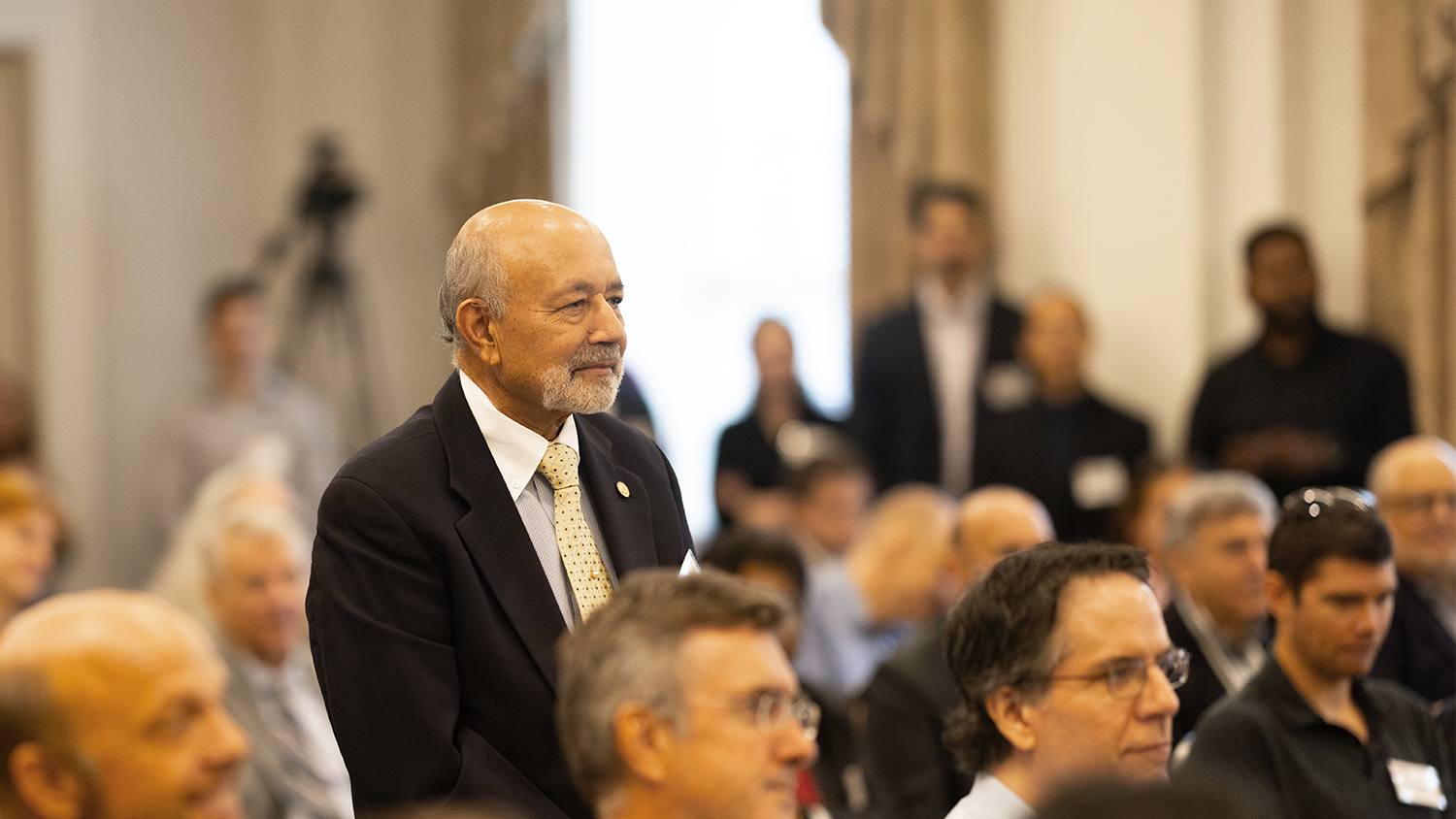Steps toward sustainability
Faculty members will lead a national research effort to reduce dependence on mined phosphorus.

Faculty members in the College of Engineering and across NC State will lead a national research effort to reduce both dependence on mined phosphates and the amount of phosphorus that leaches into soils and water. The research, funded by the National Science Foundation (NSF), will focus on issues relevant to both food security and environmental quality.
The NSF Science and Technology Center (STC) — Science and Technologies for Phosphorus Sustainability (STEPS) — will be headquartered on NC State’s Centennial Campus. The center is funded by an initial five-year, $25 million grant that is renewable for an additional five years.
Jacob Jones, Distinguished Professor of Materials Science and Engineering, will be the center’s director. College of Engineering faculty members will lead efforts within the center related to materials design, utilization of diverse forms of data, and water quality measurements and modeling, in cooperation with faculty and staff members from the College of Agriculture and Life Sciences and across the University, and at eight partner institutions. Ross Sozzani, an associate professor of plant and microbial biology at NC State, will serve as a center co-deputy director.

Phosphorus sustainability is an important and urgent societal problem. An essential chemical element, phosphorus plays a critical role in fertilizers used in food systems. But there are problems with supply — the industry relies on mined, non-renewable phosphates that could soon be depleted — as well as system inefficiencies and downstream effects on the environment.
The center’s ambitious goals include facilitating a 25 percent reduction in human dependence on mined phosphates and a 25 percent reduction in phosphorus losses to soils and water resources within 25 years, leading to enhanced resilience of food systems and reduced environmental damage.
Without intervention, the environmental, economic and sustainability issues involving phosphorus will escalate as the world’s human population grows by another 2 billion people by 2050.” — Ross Sozzani
Current food production systems rely heavily on phosphorus fertilizers, most of which originate from non-renewable phosphate deposits that are mined outside of the United States. Once in the food system, only 20 percent of the input phosphorus is ultimately incorporated into the human diet due to multiple system losses and inefficiencies. The “lost” phosphorus accumulates in soils and freshwater sources.
“Phosphorus-driven algal blooms impair safe drinking water and marine life, and the increasing flux of phosphorus to oceans also leads to an expansion of coastal dead zones,” Sozzani said. “Without intervention, the environmental, economic and sustainability issues involving phosphorus will escalate as the world’s human population grows by another 2 billion people by 2050.”

“STEPS develops the materials, technologies and best management practices to recover, recycle and reuse phosphorus,” said Jones. “Recycling and reusing phosphorus means developing technologies and methods to capture ‘lost’ phosphorus in soils and surface waters — as well as in animal and human waste — and then reusing that recycled phosphorus in fertilizers.”
STEPS will be an interdisciplinary center, integrating contributions across the physical, life, social and economic sciences.
The center’s headquarters will be housed in the new Plant Sciences Building, home of the University’s Plant Sciences Initiative, on Centennial Campus. Researchers will draw from a wide variety of academic disciplines — ranging from agricultural engineering, biomolecular and chemical engineering, and materials science to chemistry, crop sciences, economics and sociology — to develop materials and technologies that can be deployed at the human scale while considering regional and global issues.
Jan Genzer, S. Frank and Susan Culberson Distinguished Professor of Chemical Engineering, and Yaroslava Yingling, professor in the Department of Materials Science and Engineering (MSE), will lead the center’s research on materials that will underpin the new technologies that will come out of the effort. Yingling and Rada Chirkova, professor in the Department of Computer Science, will be co-leads on a convergence informatics initiative that will help put STEPS data and analytics to use. Maude Cuchiara, research associate professor in MSE, is STEPS’ acting managing director.
In the Department of Civil, Construction, and Environmental Engineering (CCEE), Douglas Call and Daniel Obenour, associate professors, and S. James Ellen Distinguished Professor Detlef Knappe will conduct research on phosphorus in a variety of environments and materials, including waterways, wastewater and animal manures. New environmental engineering labs in Fitts-Woolard Hall, the College of Engineering’s newest building on Centennial and the new home of CCEE, will play a critical role.
An inclusive vision
STEPS has a strong inclusivity goal. STEPS will foster progress toward a goal of more than 50 percent participation by members of underrepresented minority groups, including more than 50 percent pre-baccalaureate participation to further broaden and develop the STEM pipeline.
“This strong commitment to inclusivity and diversity is a testament to beneficial partnerships with organizations and institutions that allow us to recruit talented participants while strengthening new research collaborations,” said Louis Martin-Vega, dean of the College of Engineering. “Diversity in thought, culture, experience and approach toward problem solving is truly required to address a societal issue that no single discipline or group can solve on its own.”
STEPS partner institutions include Arizona State University, Appalachian State University, the Joint School of Nanoscience and Engineering at North Carolina Agricultural and Technical State University and the University of North Carolina Greensboro, the University of Florida’s Institute of Food and Agricultural Sciences, Marquette University, RTI International and the University of Illinois.
The College of Engineering leads more than 20 research centers and institutes and is one of only two engineering schools to ever lead two NSF Engineering Research Centers at once. STEPS is the first NSF STC for which NC State has been named as the lead institution.
- Categories:


